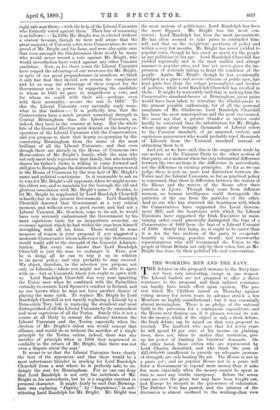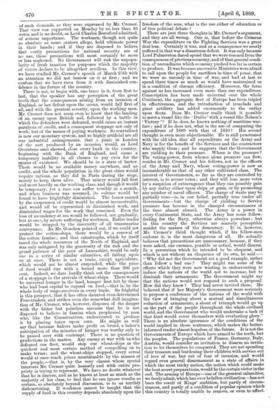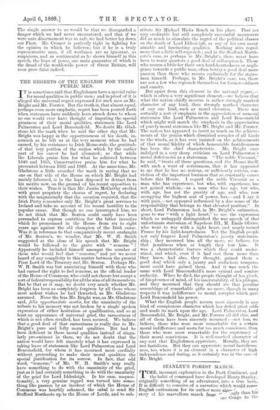THE WORKING MEN AND THE NAVY. T HE debates on the
proposed increase to the Navy have- not been very interesting, except in one respect. The Liberal leaders are not prepared to offer a direct resistance to the proposal, and their indirect resistance can hardly have much effect upon opinion. The pro- test which Mr. Childers raised on Thursday against voting money for seven years in advance struck a few Members as highly constitutional ; but it was essentially almost meaningless. There is no pledge of the national faith in the provision for a continuous expenditure, and the House next Session can, if it pleases, rescind its vote for the money, while if the object is only a fresh debate, the fresh debate can be raised on that very proposal to rescind. The landlord who says that for seven yearn he will spend 10 per cent. of his income on planting trees, does not, when he makes that resolution, give- up his power of limiting his foresters' demands. On the other hand, those critics who are represented by Lord Charles Beresford, and who think the sum of X21,000,000 insufficient to provide an adequate increase of strength, are only beating the air. The House is not in a panic yet ; and no popular House not in a panic will force a Government to expend more money than it asks for, more especially when the money cannot be spent in time to meet any visible emergency. Before the seven years are over the great war may have been fought out, and Europe be steeped in the quiescence of exhaustion. The Defence Vote has passed, and the interest of the discussion is almost confined to the working-class view of such demands, as they were expressed by Mr. Cremer. That view was supported on Monday by no less than 85 votes, and is no doubt, as Lord Charles Beresford admitted, of serious importance. The workmen, though not quite BO absolute as some orators allege, hold ultimate power in their hands ; and if they are disposed to believe that costly precautions for national security are of no use, those precautions will most certainly be more or less neglected. No Government will risk the unpopu- larity of fresh taxation for purposes which the majority of voters declare to be altogether needless. In this view, we have studied Mr. C.remer's speech of March 25th with an attention we did not bestow on it at first ; and we confess that we have risen from it with diminished con- fidence in the future of the country.
There is not, to begin with, one trace in it, from first to last, that the speaker has any perception of the great truth that the consequences arising from an invasion of England, or her defeat upon the ocean, would fail first of all, and with the greatest severity, upon the working men. Cremer does not seem even to know that the landing of an enemy upon British soil, followed by a battle in which the defenders were defeated, would cause an instant paralysis of credit, and a consequent stoppage not only of work, but of the means of paying workmen. So centralised is now our monetary system, and so highly artificial are all our industrial arrangements, that a panic in London of the sort produced by an invasion would, as Lord Overstone once showed, close every bank in the country, beginning with the Bank of England, and cause a temporary inability in all classes to pay even for the means of existence. We should be in a state of barter. There would be no available money anywhere, and no credit, and the whole population in the great cities would require rations, as they did in Paris during the siege, merely to keep them alive. That misery would fall first and most heavily on the working class, and though it would be temporary, yet a race can suffer terribly in a month, and when business was resumed, its volume would be found to have frightfully diminished. The losses caused by the suspension of credit would be almost inconceivable, and would all be represented in diminished work, and diminished wages for the work that remained. Even the loss of ascendency at sea would be followed, not gradually, but at once, by severe suffering for workmen. Entire trades would be stopped by the insecurity of all transmarine conveyance. As Mr. Goschen pointed. out, if we could not protect the cotton-ships, there would be a renewal of the cotton famine ; and that catastrophe, which by itself taxed the whole resources of the North of England, and was only mitigated by the generosity of the rich and the grand patience of the poor of Lancashire, would be only one in a series of similar calamities, all falling upon us at once. There is not a trade, except agriculture, which would not be almost suspended, while the price of food. would rise with a bound more than 300 per cent. Indeed, we dare hardly think out the consequences of a stoppage in the arrivals of wheat-ships. There would be universal hunger in the land, hunger first felt by those who had least capital to expend. on food,—that is, by the whole body of wage-receivers in every trade. So frightful is this prospect, that it has often daunted even determined Free-traders, and strikes even the somewhat dull imagina- tion of Mr. Cremer, who, however, disposes of the danger with the bitter but pointless sarcasm that he is not disposed to believe in famine when prophesied by men who, like the Conservatives, endeavoured to produce it by placing taxes upon corn. He might as well say that because bakers make profit on bread, a baker's anticipation of the miseries of hunger was worthy only to be passed over with contempt. There is no question of predictions in the matter. Any enemy at war with us who defeated our fleet, would stop our wheat-ships as the quickest and most certain method. of compelling us to make terms ; and the wheat-ships stopped, every cereal would at once reach prices unattainable by the masses of the people,—that is, by the very classes whose special interests Mr. Cremer quite honestly and with entire pro- priety is trying to represent. We have no doubt whatever that he is sincere, and as he knows at least as much as the majority of his class, to find that he can ignore results so certain, so absolutely beyond. discussion, is to us terribly disheartening: If workmen cannot be taught that the supply of food in this country depends absolutely upon the freedom of the seas, what is the use either of education or of free political debate ?
There are just three thoughts in Mr. Cremer's argument, and they are all wrong. One is, that before the Crimean War the expenditure on the Fighting Services was a great deal less. Certainly it was, and as a consequence we nearly suffered in that war a disastrous defeat. It was only because Lord Palmerston dared spend that we were rescued from the consequences of previous economy, and of that general condi- tion, of unreadiness which economy pushed too far is certain to produce. It was because successive Ministries were afraid to call upon the people for sacrifices in time of peace, that we were so unready in time of war, and had at last to spend three times as much as would have maintained us in a condition of chronic efficiency. Moreover, the force against us has increased even more than our expenditure. Conscription has been made universal over the whole Continent, the aggregate fleet of Europe has been tripled in effectiveness, and the introduction of ironclads and giant artillery has added enormously to the outlay upon fleets. Does Mr. Cremer really think it possible to meet a vessel like the Duilio ' with a vessel like Nelson's Victory ' ? If he does, he knows nothing of maritime war- fare ; and if he does not, what is the use of comparing the expenditure of 1889 with that of 1850 His second thought is even more objectionable. He is still penetrated with the old idea that all expenditure on the Army and Navy is for the benefit of the Services and the contractors who supply them ; and he suggests that the Government are yielding to their pressure. Where is the pressure ? The voting-power, from whence alone pressure can flow, resides in Mr. Cremer and his fellows, not in the officers of the Army and Navy, whose voting-power is now as inconsiderable as that of any other cultivated class. The interest of Governments, so fax as they are controlled by interest, is to secure votes ; and they will lose more votes by a suspicion of extravagance than they can possibly gain by any outlay either upon ships or guns, or by promoting any number of naval officers. The charge of waste may be partially true—is, in our belief, partially true under all Governments—but the charge of yielding to Service pressure has become in the changed circumstances of the time almost absurd. The Army is a, power in every Continental State, and the Army has some fellow-. feeling for the Navy, otherwise always powerless ; but in this country the Services are scarcely perceptible amidst the masses of the democracy. It is, however, Mr. Cremer's third thought which, if his fellow-men endorse it, is the most dangerous of all. He actually believes that precautions are unnecessary, because, if they were asked, our enemies, possible or actual, would disarm. In a peroration which he intended to be eloquent, and which is not without an eloquence of its own, he said :- " Why did not the Government set a good example, rather than follow a bad one ? They might use some of the efforts which they were now wasting in endeavouring to induce the nations of the world not to increase, but to diminish their armaments. The Government might say that the nations would not respond to such a proposal. How did they know ? They had never invited them. He believed that if her Majesty's Government were seriously to propose a conference of the nations of the world with the view of bringing about a mutual and simultaneous reduction of armaments, a shout of triumph would go up on the part of the people throughout the whole civilised world, and the Government who would undertake a task of that kind would cover themselves with everlasting glory." There is an absolute ignorance of the conditions of the world implied in those sentences, which makes the better- informed reader almost hopeless of the future. It is not the Governments of Europe which have armed to the teeth, but the peoples. The populations of France, Germany, Italy, Austria, would consider an invitation to disarm an invita- tion to let themselves be conquered.. They are not spending their treasure and burdening their children with service out of love of war, but out of fear of invasion, and would regard even general disarmament as a state of affairs in which the most tricky nation, the nation which could make the best secret preparations, would be the certainvictor in the end. The arming of Europe one of the greatest calamities, we freely admit, which has ever befallen civilisation—has not been the result of Kings' ambition, but partly of circum- stances, and partly of a condition of popular opinion which this country is totally. unable to remove, or even to affect. The single answer to us would be that we disregarded a danger which we had never encountered, and that if we were sure disarmament was so safe, we had better lay down our Fleet. Mr. Cremer is perfectly right in fighting for the opinion in which he believes ; but if he is a truly representative man, if all workmen are as ignorant, as suspicious, and as sentimental as he shows himself in this speech, the hope of peace, one main guarantee of which is the dread of the world-wide power of Great Britain, will soon grow faint indeed.




































 Previous page
Previous page